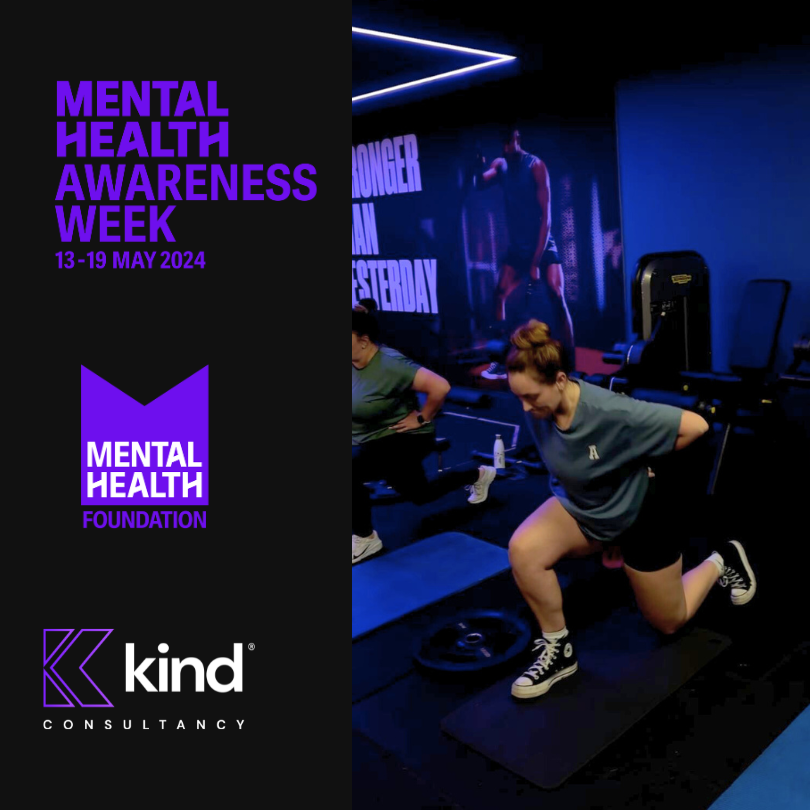Moving More for Mental Health + Industry News
If you’re a regular visitor to the Kind Consultancy LinkedIn page, you’ve probably already seen that this week is Mental Health Awareness week in the UK and for this year the theme chosen by the Mental Health Foundation is “Moving More for Our Mental Health”. We’ve been highlighting the ways in which members of the Kind team keep themselves moving throughout the week, and discussing the psychological and emotional benefits they experience.
So how does movement link to mental wellbeing?
Scientists believe that exercise can release endorphins, dopamine and serotonin. Endorphins alleviate pain, lower stress and improve mood. Dopamine produces feelings of pleasure, satisfaction and motivation. Serotonin regulates mood and, at normal levels, makes people feel happy, calm and emotionally stable. All three together then, can make a big difference to how we feel and how well we can function.
With mental health there are no instant cure-alls, but regular exercise can both help to recover from periods of low mood, and to act as a preventative against developing stress, depression or anxiety. The UK Chief Medical Officer’s guidelines recommend aiming for at least 2.5 hours per week of moderately intense activity, 75 minutes per week of vigorous activity, or a mixture of both.
How are we moving at work?
At Kind, we have regular monthly challenges that encourage the whole team to move more by either step-count or distance – recent challenges have included hitting 7000 steps every day, or walking/running over 100 miles total across the month.
It’s important to move during the work day and we all make sure to make use of our lunch hour when we’re in the office to get up and move around – we’re very luck with our location in Lichfield to be near parks that are perfect for getting some steps in within a scenic, calming environment. And even within the office, there’s the Kind Library that staff are encouraged to make use of away from their own desks, with books on mindfulness and motivation.
We’ve also had dedicated days to work on our duel mental and physical wellbeing – for example, a team spa day at Hoar Cross Hall where we could invest serious time into both exercise and relaxation and came away feeling restored and clear-headed.
How are we moving throughout the week?
Already this week we’ve checked in with Selena about her morning runs and lunchtime walks, and I’ve talked about my hiking and running. Other members of the team find other ways to move regularly –

Shai Cassidy: “I make sure to work out every day, incorporating both cardio and strength exercises into my routine. Lately, I’ve been consistent with this habit and have seen a great improvement in my mental well-being, even if it’s just a short walk for 45 minutes. This time allows me to focus on myself and recharge.”

Lynsey Moore: “In my downtime, I love spending time outdoors, in particular at the stables with my daughter and her pony Lulu, which I find both calming and uplifting”
Mathew Kind: “My main focus for keeping a clear head and dealing with the day to day challenges and stresses of running a business is through attending the Gym”
How can you move more?
If you feel like you’re not moving enough and want to tap in to the mental health benefits of regular movement, it’s best to start small and then scale up. A great first step is to start walking as part of your daily routine – if you live within a reasonable distance of where you normally go to work or somewhere you regularly shop, but you normally drive or take public transport, try walking one of those trips instead.
Once you’re walking more, think about what type of movement you’d like to do more of. Maybe working on your mental health is the motivation you need to join a gym, where you can try a wide variety of different exercises within one convenient, fully-equipped space. If you prefer to be outdoors and you find nature relaxing you could look into TCV’s Green Gym programme which combines outdoor activity with conservation. Or maybe you’ve never run before and want a gradated approach to taking it up – try the NHS Couch to 5K Programme.
Find out more about the links between movement and mental health, and get tips and resources on how to start moving more at the Mental Health Foundation website – https://www.mentalhealth.org.uk/our-work/public-engagement/mental-health-awareness-week – and look out for more posts from us across the rest of this Mental Health Awareness Week sharing how other Consultancy team members are moving.
Industry News Overview
Two recent headlines that are worth knowing about –
- Financial Ombudsman Service Issues Update on Car Finance Commission Complaints
Regular followers will know we’ve been closely following the Car Finance Discretionary Commission Arrangements Complaints situation (see previous posts on that here and here) and last week the Financial Ombudsman Service published an update, stating that it’s important that consumers understand their plans and that the industry understands their expectations.
The Ombudsman currently have approximately 20,000 open complaints relating to car finance commission. They are awaiting a Court of Appeal hearing on 3 complaint cases and a separate judicial review of an already-made Ombudsman decision on another complaint. The outcome of these could impact the regulator’s approach going forward for similar cases.
Elsewhere, we are still in the midst of the FCA freeze on final responses for DCA complaint – and we won’t know more about their review of the historical use of motor finance discretionary commission arrangements until September.
In light of those two major roadblocks, the Ombudsman wants to make it clear they will continue to accept and investigate complaints as far as they can.
You can read that update in full here and find their information for customers and for financial businesses, including details on what they expect firms to send them when they receive a DCA complaint.
2. New ONS Stats Show Wages Rising and Vacancies Falling
New data from the Office of National Statistics shows wages rising by 6% between January and March this year – or 2.4% after taking inflation into account. They also show the number of vacancies in the UK dropping by 26,000 – not a gigantic drop, and the number of vacancies is still above pre-pandemic levels.
What are the knock-on implications of these shifts? On the one hand it suggests we might see candidates over the coming months seeking slightly higher starting salaries, but on the other it suggests that employers may have more candidates to choose from for each role. The effects of these slowly developing rises and falls are not always immediately apparent though, and it will be interesting to see how those measures move across the rest of the year.
For more detail, dig in on the full ONS report on Vacancies and Jobs for May 2024 here.
– Catherine Tieley




